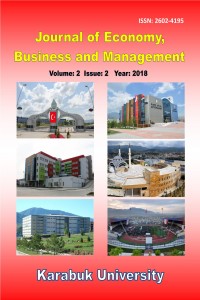Abstract
There is a riba,
interest prohibition in Islamic economy thought. This prohibition has been put
in place to prevent problems that may arise in economic and social life. During
the Jahiliyyah era, there was a group that obtained their income from interest.
They used to get back excessively more money than they lent without considering
the conditions of the borrower. Islam has also banned interest among the arrangements
it has brought in the economic field. He encouraged lending, and proposed
postponement in cases of difficulty in payment. With other regulations and the
prohibition of interest, Islam wanted to prevent the accumulation of wealth in
certain sections and to reduce the income gap between the rich and the poor.
Thus, it is aimed to spread the wealth to every category and to actualise
social welfare.
In this study, al-Razi’s commentaries on the
prohibition of Riba (Interest) in Mafatih al-Ghayb will be summarized.
Keywords
References
- Ahmed b. Hanbel. (2001). Müsned. Müessesetü’r-Risâle.
- Apaydın, Y. (2002). Kıyas. Türkiye Diyanet Vakfı İslam Ansiklopedisi (C. 27, ss. 529-539). İstanbul: Türkiye Diyanet Vakfı.
- Aydın, M. A., & Hamidullah, M. (2002). Köle. Türkiye Diyanet Vakfı İslam Ansiklopedisi (C. 26, ss. 237-246). İstanbul: Türkiye Diyanet Vakfı.
- Beyhakî, A. b. el-Huseyn. (2003). Şuabu’l-İmân (1. bs, C. 1–14). Riyâd: Mektebetü’r-Rüşd.
- Buhârî, M. b. İ. (1422h). Sahîh. Dâru Tûki’n-necât.
- er-Râzî, F. (1420h). Mefâtihu’l-gayb (3. bs). Beyrut: Dâru İhyâi’t-turâsi’l-Arabî.
- et-Tirmizî, M. b. İ. (1998). Sünen. Beyrut: Dâru’l-garbi’l-İslâmî.
- Koca, F. (1998). Hikmet. Türkiye Diyanet Vakfı İslam Ansiklopedisi (C. 17, ss. 514-518). İstanbul: Türkiye Diyanet Vakfı.
- Müslim b. Haccâc. (t.y.). Sahîh (C. 1–5). Beyrut: Dâru İhyâi’t-turâsi’l-Arabî.
- Özsoy, İ. (1995). Faiz. Türkiye Diyanet Vakfı İslam Ansiklopedisi (C. 12 ss. 110-126). İstanbul: Türkiye Diyanet Vakfı.
- Yavuz, Y. Ş. (1995). Fahreddin er-Râzî. Türkiye Diyanet Vakfı İslam Ansiklopedisi (C. 12, ss. 89-95). İstanbul: Türkiye Diyanet Vakfı.
Fahreddin er-Râzî’nin Mefâtihu’l-Gayb İsimli Tefsirinde Ribâ (Faiz) Yasağını Konu Alan Ayetlere Getirmiş Olduğu Yorumlar
Abstract
İslam iktisat düşüncesinde ribâ, faiz yasağı bulunmaktadır.
Bu yasak, ekonomik ve sosyal hayatta ortaya çıkabilecek problemleri önlemek
amacıyla konulmuştur. Cahiliye döneminde gelirlerini faizden elde eden bir grup
bulunmaktaydı. Bunlar vermiş oldukları parayı, borçlunun durumuna bakmadan kat
kat, fazlasıyla geri almakta idiler. İslam, iktisadi alanda getirmiş olduğu
düzenlemeler arasında ribâyı da yasaklamıştır. Borç vermeyi teşvik etmiş, ödeme
güçlüğü çekildiği durumlarda ertelenmesini önermiştir. Borçlunun ödeme imkânı
kalmadığı zaman borcun bağışlamasını, sadaka kapsamında değerlendirmiştir.
Diğer düzenlemelerle birlikte ribâ yasağıyla İslam, servetin belirli kesimlerde
toplanmasını engellemek ve zengin fakir arasındaki gelir farklılığını azaltmak
istemiştir. Böylece zenginliğin her kesime yayılmasını, toplumsal refahın
gerçekleşmesini hedeflenmiştir.
Bu çalışmada müfessir Râzî’nin Mefâtihu’l-gayb isimli
eserinde Ribâ yasağıyla ilgili ayetlere getirmiş olduğu yorumlar
özetlenecektir.
Keywords
References
- Ahmed b. Hanbel. (2001). Müsned. Müessesetü’r-Risâle.
- Apaydın, Y. (2002). Kıyas. Türkiye Diyanet Vakfı İslam Ansiklopedisi (C. 27, ss. 529-539). İstanbul: Türkiye Diyanet Vakfı.
- Aydın, M. A., & Hamidullah, M. (2002). Köle. Türkiye Diyanet Vakfı İslam Ansiklopedisi (C. 26, ss. 237-246). İstanbul: Türkiye Diyanet Vakfı.
- Beyhakî, A. b. el-Huseyn. (2003). Şuabu’l-İmân (1. bs, C. 1–14). Riyâd: Mektebetü’r-Rüşd.
- Buhârî, M. b. İ. (1422h). Sahîh. Dâru Tûki’n-necât.
- er-Râzî, F. (1420h). Mefâtihu’l-gayb (3. bs). Beyrut: Dâru İhyâi’t-turâsi’l-Arabî.
- et-Tirmizî, M. b. İ. (1998). Sünen. Beyrut: Dâru’l-garbi’l-İslâmî.
- Koca, F. (1998). Hikmet. Türkiye Diyanet Vakfı İslam Ansiklopedisi (C. 17, ss. 514-518). İstanbul: Türkiye Diyanet Vakfı.
- Müslim b. Haccâc. (t.y.). Sahîh (C. 1–5). Beyrut: Dâru İhyâi’t-turâsi’l-Arabî.
- Özsoy, İ. (1995). Faiz. Türkiye Diyanet Vakfı İslam Ansiklopedisi (C. 12 ss. 110-126). İstanbul: Türkiye Diyanet Vakfı.
- Yavuz, Y. Ş. (1995). Fahreddin er-Râzî. Türkiye Diyanet Vakfı İslam Ansiklopedisi (C. 12, ss. 89-95). İstanbul: Türkiye Diyanet Vakfı.
Details
| Primary Language | Turkish |
|---|---|
| Subjects | Business Administration |
| Journal Section | Articles |
| Authors | |
| Publication Date | December 31, 2018 |
| Published in Issue | Year 2018 Volume: 2 Issue: 2 |


